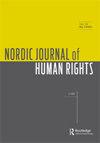普遍定期审议:国内动员的催化剂
IF 1.2
Q3 POLITICAL SCIENCE
引用次数: 0
摘要
2006年联合国普遍定期审议(UPR)出台之初,学者们就对其持怀疑态度,怀疑其合作性的“软法”方法是否能够对各国人权实践产生积极影响。然而,迄今为止对其三个周期的研究充满了该机制影响的证据。这是怎么回事?强调国家社会化的文化适应理论是普遍定期审议学术中最突出的解释。本文认为,虽然文化适应是一个令人信服的解释,但它未能认识到国内行为体在影响国家遵守,特别是普遍定期审议的成功方面发挥的关键作用。国内动员理论强调国家政治和参与者对合规的影响,作为理解普遍定期审议影响的另一种视角提出。对普遍定期审议现有研究的回顾表明,该机制是动员的催化剂,为国内行为体与政府之间的对话提供了杠杆和机会。以这种方式认识普遍定期审议的价值对参与普遍定期审议的学者和实践者具有重要意义。本文章由计算机程序翻译,如有差异,请以英文原文为准。
The Universal Periodic Review: A Catalyst for Domestic Mobilisation
ABSTRACT At its introduction in 2006, scholars were sceptical of the United Nations (UN) Universal Periodic Review (UPR), doubting whether its cooperative, ‘soft law’ approach would be able to affect positive changes to states’ human rights practices. Yet research on its three cycles to date is replete with evidence of the mechanism’s impact. What accounts for this? The theory of acculturation, which highlights states’ socialisation, is the most salient explanation posed in UPR scholarship. This article argues that while acculturation is an otherwise compelling account, it fails to recognise the vital role domestic actors play in affecting state compliance and, particularly, the success of the UPR. The domestic mobilisation theory, which emphasises the influence of national politics and players on compliance, is forwarded as an alternative lens through which to grasp the UPR’s impact. A review of existing research on the UPR reveals the mechanism to be a catalyst for mobilisation, providing leverage and an opportunity for dialogue between domestic actors and governments. Appreciating the UPR’s value in this way has implications for scholars and practitioners engaging it.
求助全文
通过发布文献求助,成功后即可免费获取论文全文。
去求助
来源期刊

Nordic Journal of Human Rights
POLITICAL SCIENCE-
CiteScore
1.00
自引率
25.00%
发文量
29
期刊介绍:
The Nordic Journal of Human Rights is the Nordic countries’ leading forum for analyses, debate and information about human rights. The Journal’s aim is to provide a cutting-edge forum for international academic critique and analysis in the field of human rights. The Journal takes a broad view of human rights, and wishes to publish high quality and cross-disciplinary analyses and comments on the past, current and future status of human rights for profound collective reflection. It was first issued in 1982 and is published by the Norwegian Centre for Human Rights at the University of Oslo in collaboration with Nordic research centres for human rights.
 求助内容:
求助内容: 应助结果提醒方式:
应助结果提醒方式:


